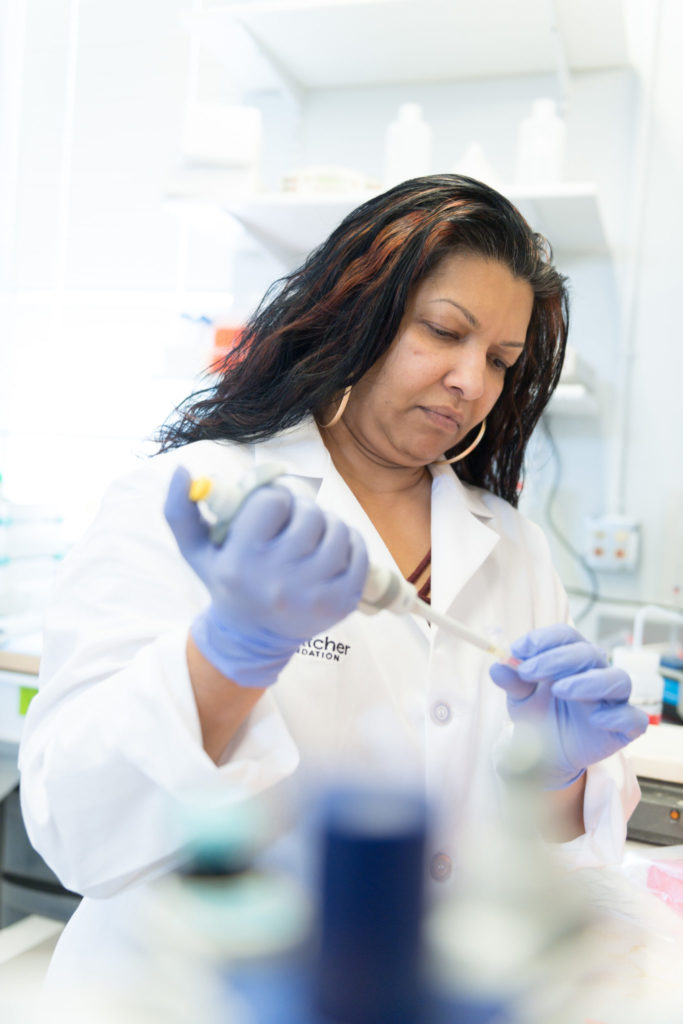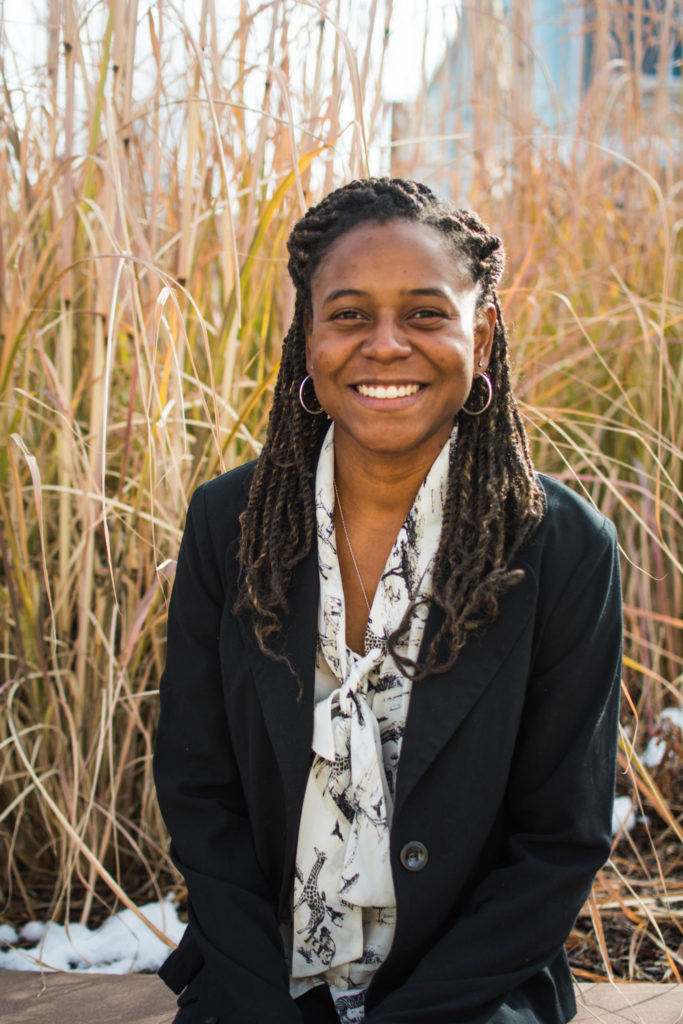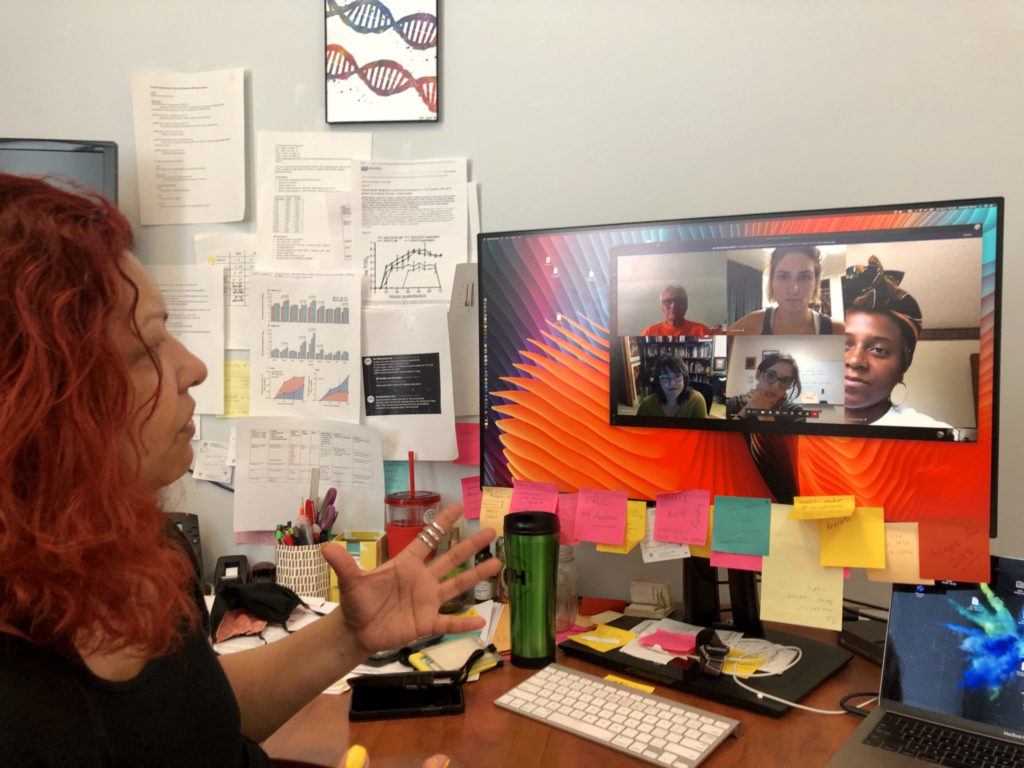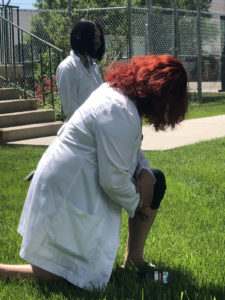

Alex Bailey: What’s your role in the College, and why is it important?
Rushika Perera: I’m an associate professor of virology and the chair of the Diversity and Inclusion Committee. I think it’s a really important position because I can connect with a lot of the leadership as well as the constituents of CVMBS, and I am a people person. I am able to really bridge that conversation and try to see where the gaps are in terms of moving the needle, even a little bit, in the diversity, equity, and inclusion realm. And I think I have acquired the trust of the people who I work with, which is important to be able to be transparent and be able to get things done.
AB: Something I appreciate about you is that you’re an authentic communicator. You don’t mind calling people out on their BS, but you’re also good about making sure that everybody is heard and seen.
RP: Thank you! That means a lot!
AB: With all the racial and civil unrest of 2020, did your role become more important or did you have to do more heavy lifting?
RP: The committee kept doing what we’d been doing, but no one was listening to us before, and suddenly they started listening. Once they started listening, we could get lots of things accomplished. It saddens me that for four years we were talking about what needed to get done. We were proposing actions and programs that needed attention, but we didn’t have the power to make them happen, and it took George Floyd’s death to wake people up.

AB: So what’s the committee currently working on?
RP: We’re working on several things. The first is to hire the assistant dean for diversity, equity, and inclusion. This will be a full-time dedicated position for this effort. Also, I’m excited that we now have the diversity, equity, and inclusion strategic pillar for CVMBS. I think the leadership has recognized that we really need to focus on policies and funding toward those programs. I’m also really excited about the committee’s work on inclusive pedagogy and our cultural competency programs for faculty, staff, and students.
AB: Can you define cultural competency?
RP: For me, cultural competency means really understanding the person in front of me. Understanding their struggles. Where did they come from? What is their background? Who are they? How do they learn? Just really getting to know someone. You have to be interested in their life and in their success.
AB: I 100% agree.
RP: We also need to include diversity conversations in the curriculum of our graduate and undergraduate programs. We need our students to be culturally competent so that they know how to support any individual in the College, whether they’re LGBTQ+ or people of color. Our students have to know how to be allies.
AB: Did you come to CSU with diversity efforts in mind?
RP: No. I was at Purdue, where it’s very diverse. There are thousands of international students there, and I just never even thought about it until I came to Colorado. And then I walked into a coffee shop and everybody was staring at me and I wasn’t sure why. I knew it was not because I was hot.
AB: It was. I’m sure of it.
RP: And even now, if I go to a bar in Loveland, the whole room just turns and looks at me as if I’m an exotic animal.
AB: Yes! Oh, my gosh! I know the feeling. What are some of the personal discrimination events that you might have gone through on your way to your position?
RP: When I first got the job at CSU, one of my professors said, ‘Oh, you’re brown and you’re a woman, and that’s why you got the job.’ I said, ‘Thank you very much, but I think I’m good at my job.’
AB: I’m the only African American in my class, and at orientation one of my classmates told me I was the token Black girl. No. I worked hard to be here.
RP: More recently, when COVID-19 hit, I said I can test antivirals. I had never worked on this virus, but I’m a virologist with 30 years of training and I’ve worked on a lot of other viruses. But a colleague of mine said, ‘Are you competent enough to work on SARS?’ It was so shocking that I didn’t know how to answer.
AB: I’d be offended and would struggle to find that line between staying good colleagues and making sure you say the right thing.
RP: I think I chose not to say anything because I needed to stay peaceful within myself, and even if I had said something their behavior was not going to change. But I feel now that I should have said something because I’m never going to forget that.
AB: Something I’m working on is learning how to have those uncomfortable conversations and be OK with it if we disagree; as long as you heard me, then I think we can make this work.

RP: I was really impressed by you during the George Floyd situation. We had many meetings, and you were so calm and so gracious. I didn’t see anger in you, which I thought was amazing. You were ready to come to the table and to have a conversation. I’m working on being better at having confrontational conversations with good friends who are colleagues. I can vehemently disagree with them, and we can still be friends because they trust where I’m coming from. That’s why transparency is so important. If they know you to your core and trust you, you can have any conversation and it can actually be productive, right?
AB: Do you feel a sense of belonging in your department?
RP: I do. I love MIP. When I first came here, all of the senior professors took an incredible amount of time to support me. They read my grants, they advised me, and they still do, and so I have the backing of my colleagues; it’s just such a friendly and fluid department.
AB: I’m so nervous to go out into the world and not like where I work or not know who I’m working with. I really hope that when I get out there, I’ll able to see people who look like me or who have similar mindsets.
RP: Hopefully, you are well prepared to navigate that environment and make it what you want it to be. The veterinary profession
is very white, and they say it’s associated with the cost of veterinary education. Do you think that’s the main driver?
AB: I think cost is a hindrance, but also exposure and the lack of veterinarians in communities of color. Also, not knowing about resources you can use to get to vet school or being offered the proper education at your undergraduate university. I was told a lot that I wouldn’t make it to vet school because I didn’t meet “the standard.” I didn’t even know what that meant. I made my own standard.
RP: You go, Alex! I’m an international student and my experience was similar. I didn’t have enough information on how to succeed. I was always catching up. One thing I try to do now with international students is give them that information ahead of time, so that they have a path to success that’s more informed. I think it’s the same challenge for underrepresented minorities. They need mentoring for a long period of time, right? You don’t just bring them in; you make sure they succeed.
AB: I think everybody thinks that anything that requires time will take all of their time, but really it can take just 10 minutes a day. Reach out. Send an email. Say hi. That’s all it takes to be a mentor.
RP: That’s a good line. I’m going to use it! What was 2020 like for you?
AB: After George Floyd and the 27 other shootings that happened at that time and Black Lives Matter, I was feeling so drained. I never felt like I wanted to give up, but I just needed to take a break, and I honestly needed my family or people who look like me, but I didn’t really have that here. I ended up talking to some people in my class and found out that they also identified with the same things I did. They told me I didn’t need to educate all the time. I think that really helped me refuel and get back to the fight.
RP: My Ph.D. adviser said just do your thing. Just do your thing and people will recognize it. I have one for you, Alex. What has been most challenging in terms of being the only Black student in your class?
AB: I don’t feel excluded in Fort Collins, but I feel a lack of community sometimes; so, I think that’s a challenge I struggled to overcome. The people I’ve chosen to confide in here have really helped create that community. Also, the D&I committee is very useful for me, although I don’t talk that much in it. I think finding the community has been a challenge, but I’m enjoying it and I think, so far so good. I have one more for you. How do you stay energized so you can keep pushing away barriers?
RP: Noodles! Whenever I’m sad or need energy, noodles help. You have to find little things to make you happy, right?